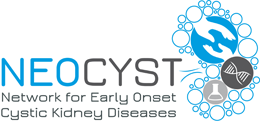Early onset cystic kidney diseases are hereditary, slowly progressive conditions that can affect not only the kidneys but also other organs. Even though considered rare diseases with incidence rates ranging from 1:5.000 -1:100.000, cystic kidney diseases represent one of the most common causes of chronic renal failure in childhood. The most common representatives are the autosomal recessive polycystic kidney disease (ARPKD), nephronophthisis (NPH), Bardet Biedl Syndrome (BBS) and HNF1ß nephropathy. The phenotypical spectrum as well as the onset of chronic renal failure can vary between the mentioned diseases. Nevertheless there is significant clinical as well as genetic overlap that hampers an early diagnosis and an individual clinical management. Additionally major variability of the individual disease courses even within the same family complicates an individual consultation and a personalized counselling.
To date more than 70 disease – causing genes have been discovered so far and further are expected in the near future. Most cystic kidney diseases are inherited in a recessive trait, implying that both copies of a gene must be affected in order to cause the disease. Parents of affected patients carrying just one mutated gene are usually asymptomatic.
Even though there has been an enormous scientific progress in the genetic unraveling as well as the molecular understanding of cystic kidney diseases, reliable genotype – phenotype correlations facilitating a personalized counselling of affected patients are still lacking. Furthermore there is no effective treatment for patients suffering of cystic kidney diseases so far.
